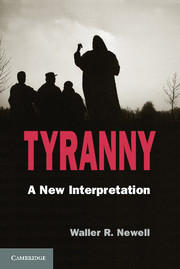Book contents
- Frontmatter
- Contents
- Acknowledgments
- Introduction
- 1 Is There an Ontology of Tyranny?
- 2 The Tyrant and the Statesman in Plato's Political Philosophy and Machiavelli's Rejoinder
- 3 Superlative Virtue, Monarchy, and Political Community in Aristotle's Politics
- 4 Tyranny and the Science of Ruling in Xenophon's Political Thought
- 5 Machiavelli, Xenophon, and Xenophon's Cyrus
- 6 Glory and Reputation
- 7 The Republic in Motion
- Conclusion
- Epilogue
- Bibliography
- Index
6 - Glory and Reputation
The New Prince
Published online by Cambridge University Press: 05 May 2013
- Frontmatter
- Contents
- Acknowledgments
- Introduction
- 1 Is There an Ontology of Tyranny?
- 2 The Tyrant and the Statesman in Plato's Political Philosophy and Machiavelli's Rejoinder
- 3 Superlative Virtue, Monarchy, and Political Community in Aristotle's Politics
- 4 Tyranny and the Science of Ruling in Xenophon's Political Thought
- 5 Machiavelli, Xenophon, and Xenophon's Cyrus
- 6 Glory and Reputation
- 7 The Republic in Motion
- Conclusion
- Epilogue
- Bibliography
- Index
Summary
A reader skeptical of my effort to draw a sharp line between ancients and moderns with respect to the understanding of tyranny and of statecraft in general (with Machiavelli inaugurating the modern approach) might well ask at this point: when Machiavelli offers to show how princes of “outstanding” virtue might achieve an immortal reputation for glory, does he not share a fairly large degree of common ground with the classical political philosophers? Is his prescription for princely honor so different from, say, Diotima's Ladder, whose second level promises great citizens and statesmen an immortal reputation, to be extolled by philosophically guided poets as Homer had earlier extolled Achilles, for the virtues they engender on behalf of the city? In this and the following chapter, I argue that, although on a certain level Machiavelli can be seen as continuing the promise of immortality to great statesmen offered by the classical thinkers, the kind of glory and immortality promised by Machiavelli are of a fundamentally different character.
That difference can be stated summarily as follows. Plato's political philosophy is offering the virtuous citizen immortality through the pursuit of traits of moderation and justice that are solicited by, and characteristic of, the cosmos in its immortal perdurance. Poets properly educated in this view of the cosmos – or suitably bowdlerized after the fact, like the re-writing of Homer prescribed by the Republic – will find artistic ways of extolling these recurrent demonstrations of virtue and passing them down to posterity for emulation by statesmen to come. In sum, for Plato, the statesman's prospects for immortality fall within nature through the statesman's actualization of his soul's potential for virtue in harmony with the whole.
- Type
- Chapter
- Information
- TyrannyA New Interpretation, pp. 271 - 344Publisher: Cambridge University PressPrint publication year: 2013



